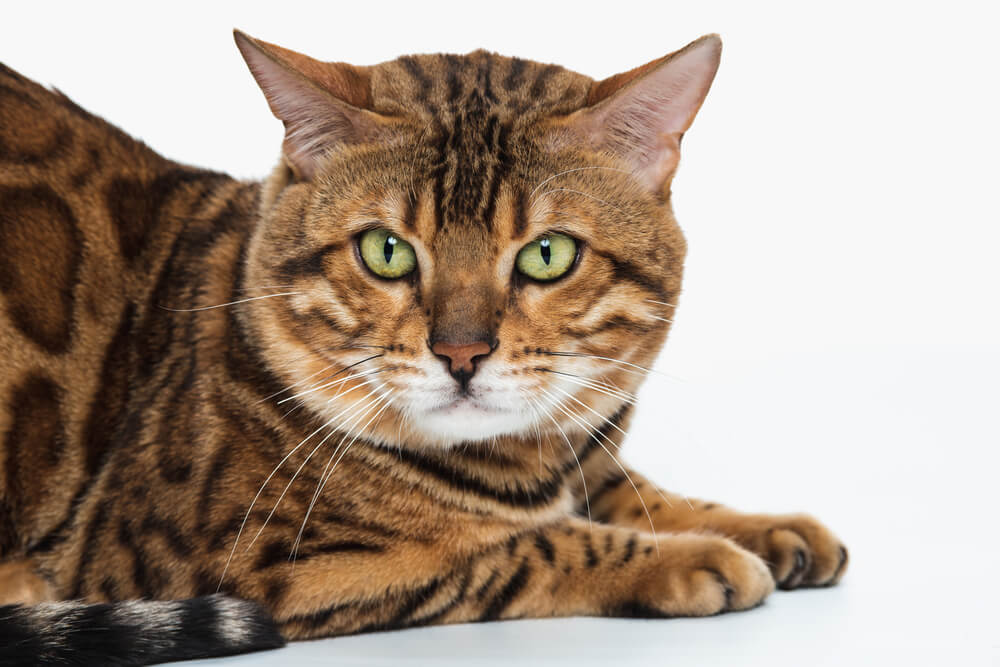It’s no secret that cats groom themselves extensively. A big part of what makes them so cute is their meticulous attention to detail when it comes to keeping clean.
But while all that self-grooming is great for keeping them looking sharp, it can also have some not-so-cute consequences. For example, one of the most common problems cat owners face is hairballs.
To answer the question, yes, Bengal cats can get hairballs just like any other long-haired cat. Bengals are particularly prone to them because of their thick, luxurious coats. If your Bengal is starting to hack and retch more than usual, it’s time to start paying closer attention to his grooming habits.
You can do a few things to reduce the occurrence of hairballs in your Bengal cat. There are hairball remedies available that can help lubricate your cat’s digestive system and make it easier for hair to pass through.
If you are concerned about your Bengal’s hairballs, or if they seem to be causing him discomfort, please talk to your veterinarian. They can help you determine the best course of action for your cat.
What Are the Symptoms of a Hairball?
Hairballs usually manifest as small, round lumps that are hard to the touch. They may be covered in fur and may or may not have a foul odor. In some cases, hairballs can cause vomiting or diarrhea.
How Do You Prevent Your Cat From Getting Hairballs?
Here are some tips to prevent your Bengal cat from getting hairballs:
- Regularly groom your Bengal cat with a brush or comb to remove loose hair.
- Feed your Bengal cat a nutritious diet that includes omega-3 fatty acids, which can help reduce shedding.
- Give your Bengal cat occasional hairball prevention treats or foods specifically formulated to help reduce hairballs.
- Keep your Bengal cat’s litter box clean to help reduce the amount of hair they ingest while grooming themselves.
- Take your Bengal cat to the vet regularly for checkups and to discuss any concerns you have about hairballs or excessive shedding.
Furthermore, you should bring your Bengal cat to the vet if they are having trouble passing a hairball, are frequently vomiting, have lost their appetite, or seem to be in pain. These could all be signs of a more serious problem.
Regular grooming, a healthy diet, and occasional hairball prevention treatments can help reduce the number of hairballs your Bengal cat experiences.
How Often Do Bengal Cats Get Hairballs?
Most cat owners are familiar with the dreaded hairball. A hairball is a mass of swallowed hair that becomes lodged in the cat’s digestive system, often causing discomfort and vomiting.
If your Bengal is starting to hack and retch more than usual, it’s likely time to start paying closer awareness to his grooming rituals.
There is no definitive answer to this question, as it can vary from cat to cat. For example, some Bengals may never experience a hairball, while others may get them regularly.
What Are the Best Ways to Remove Hairballs?
There are a few things you can do to remove hairballs:
- Use a damp cloth or paper towel to help remove the hairball from your Bengal’s fur.
- Gently massage your Bengal’s tummy in a clockwise direction with your hands to help move the hairball along.
- Give your Bengal cat a hairball prevention treat or food specifically formulated to help reduce hairballs.
- Take your Bengal cat to the vet for professional help if they are having trouble passing a hairball.
Do Bengal Cats Get More Hairballs Than Other Cats?
While all cats are prone to getting hairballs, Bengal cats may be more susceptible due to their longer coats. Grooming your Bengals regularly can help reduce the number of hairballs they experience. If your Bengal is having trouble with hairballs, there are a few things you can do to help them out.
Make sure they are getting enough fiber in their diet. This will help their digestive system move hair through more quickly and efficiently. Also, try giving them a teaspoon of olive oil or coconut oil once a day to lubricate their digestive system.
Hairballs are a common problem for cats, and Bengals are particularly prone to them because of their thick coats. While all cats can get hairballs, they can be especially troublesome for Bengals.
You can do a few things to help reduce the number of hairballs your Bengal experiences, including brushing him regularly, feeding him a diet designed to reduce hairballs, and giving him a hairball prevention treat or food.
If your Bengal has trouble passing a hairball, take him to the vet for professional help.














